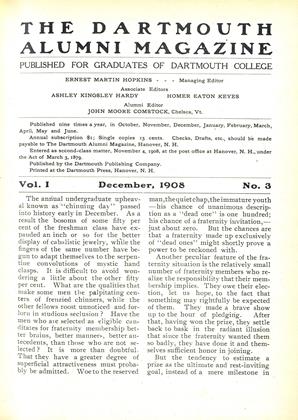The recently issued annual catalogue of the College, for 1908-1909, aside from all other attributes, at once commends itself in appearance and arrangement. The Dean's office produces in this publication a catalogue unsurpassed in attractiveness and availability of information among catalogues of the colleges, and this has been so through recent years.
In this latest edition the subject matter is in the main identical, but the arrangement of the material is noticeably different; new courses have been added, new instructors, new officers, new prizes, two more fellowships: in fact, a score of new features may be readily counted up, and every student would do well to make a careful review of the book as soon as convenient.
All of the subject matter has been more conveniently tabulated and arranged. In the beginning, the College Administration and Officers of Administration have been grouped under one head, entitled "Administrative Officers." The list of college professors and instructors follows as "The Academic Faculty," while the corps of instructors in the Medical, Thayer, and Tuck Schools follow separately, in order, instead of being placed in the back of the catalogue. In like manner, the names of all students in the graduate schools are listed in similar order after the undergraduate directory.
Beginning with next fall, twenty-two points will be required for admission to the freshman class, instead of twenty-one, as heretofore. The extra point will be gained by passing an examination in history, a modern language, or science. Owing to the fact that Dartmouth was admitted to the College Entrance Examination Board last year, the regular board examinations will be given here in Hanover, in June and September, instead of examinations prepared by the local faculty.
The most important additions to the courses of study are those in geology and mineralogy, by Professor Gold-thwaite. The courses in physiology have been greatly enlarged and expanded, and a much more thorough knowledge of the subject is now attainable. The entire work in archaeology is rearranged and greatly improved.
Two new fellowships of the value of $500 each, have been added, now making three in all. They are to be known as the George Ephraim Chamberlain Fellowship, and the Tucker Alumni Fund Fellowship.
A prize of fifty dollars is offered by Arthur L. Livermore, of New York City, in memory of Richard Hovey, of the class of 1885, for such poem of any subject, length, or verse-form, written by an undergraduate during the year, as shall seem worthy of the award.
In the name of the class of 1859 Charles Walter Pickering of Greenland, N. H., has established a prize, to yield twenty-five dollars yearly, to be awarded to that member of the senior or junior classes who shall present the best thesis upon a historical subject, under conditions as prescribed by the History Department.
A prize of fifty dollars is offered by an anonymous alumnus for the best Dartmouth story written by an undergraduate during the year. The story may be of any time or nature so long as it deals with the College, the college life, or the college men.
A concise summary and general information of the Medical, Thayer, Tuck, and Summer Schools appears in the hack part of the book, together with the summary by states and countries of the 1233 students.
 View Full Issue
View Full Issue
More From This Issue
-
 Article
ArticlePRESIDENT TUCKER'S SPEECH AT THE NEW YORK ALUMNI DINNER, DECEMBER 8, 1908*
December 1908 -
 Article
ArticleThe annual undergraduate
December 1908 -
 Article
ArticleGEORGE TICKNOR AND THE COLLEGE LIBRARY
December 1908 By Sidney B. Fay -
 Class Notes
Class NotesCLASS OF 1873
December 1908 By Rev.S. W. Adriance -
 Article
ArticleCHINNING SEASON RESULTS
December 1908 -
 Article
ArticleCOLLEGE NOTES
December 1908
Article
-
 Article
ArticleNEW COACH FOR HOCKEY
January, 1910 -
 Article
ArticleWEBBER ELECTED TENNIS CAPTAIN
-
 Article
ArticleFaculty news
June • 1985 -
 Article
ArticleAn Unusual Trio of First Novels
MAY 1996 -
 Article
Article.... About Twenty-Five Years Ago . . . .
March 1934 By Hap Hinman '10 -
 Article
ArticleThayer School
June 1961 By S. RUSSELL STEARNS CE'38

